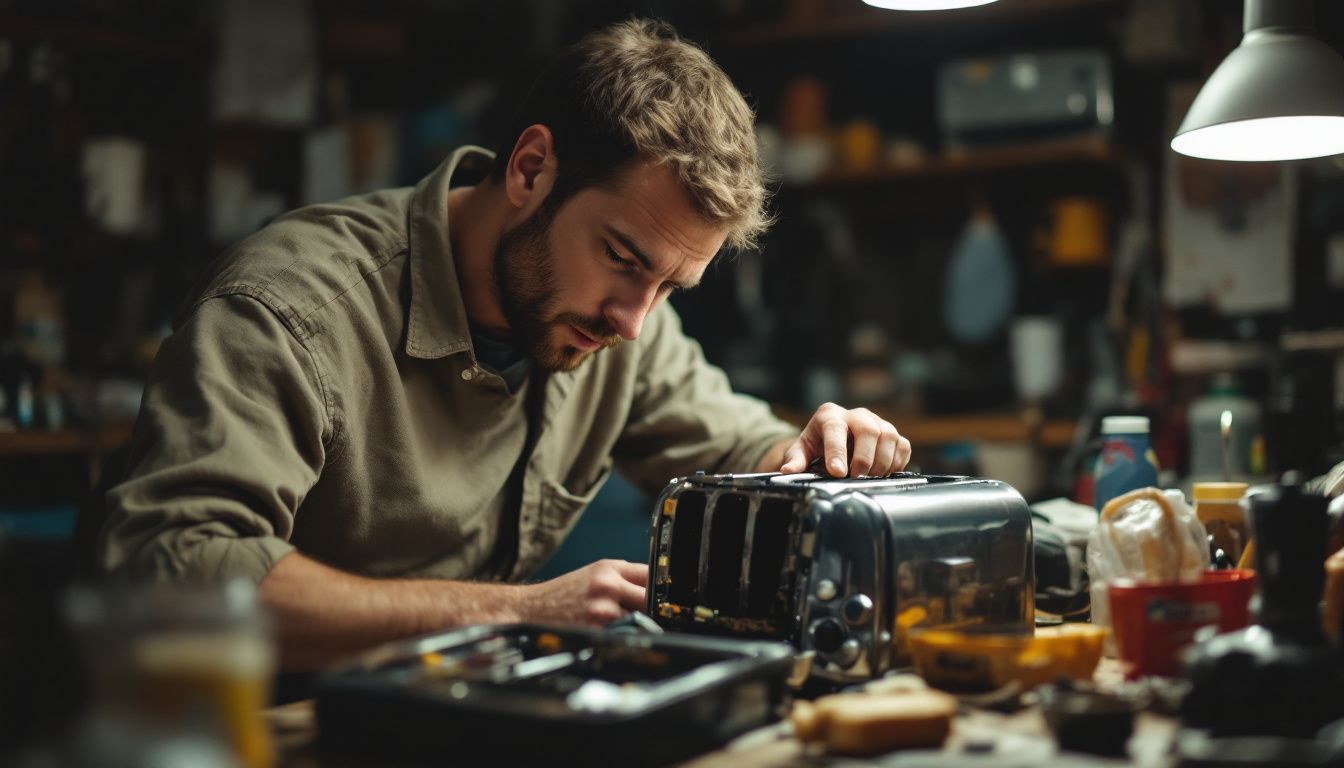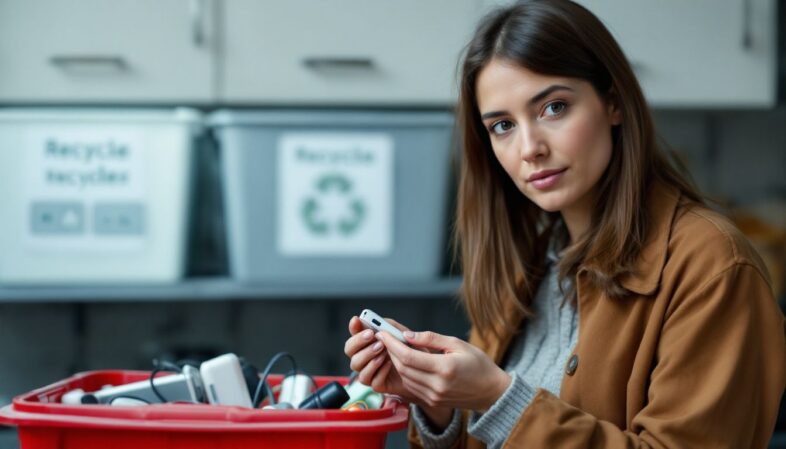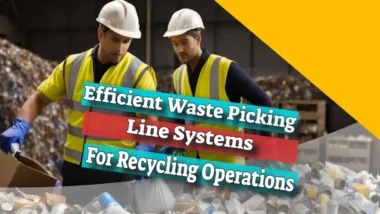Many people ask, “Can I Put Small Electrical Items In The Recycle Bin Safely?” It's an important question. Small electrical items include gadgets with plugs or batteries. Examples are mobile phones and garden power-tools.
Proper disposal is key for two reasons: it protects the environment and ensures safety. Recycling stops harmful waste from polluting our land.
No. Don't! If you do it in the UK you are strictly breaking waste law! (But, we doubt that anyone is ever punished for it.)
Local rules can differ. Some places accept these items in special recycling bins. Many retail stores also help by collecting old electronics when you buy new ones.
Less than one-third of the UK's electrical waste gets recycled each year. This needs to change to reduce pollution.
The Waste Electrical and Electronic Equipment Directive (WEEE) started in 2007. It makes European companies recycle their e-waste.
Craig Pryce, who has worked in this field for 17 years, stresses the UK's need to improve recycling efforts—around one million tonnes of electrical waste is generated yearly!
To safely dispose of your small gadgets, follow local guidelines or use resources like [recycleyourelectricals.org.uk](http://recycleyourelectricals.org.uk). They offer a postcode locator to find nearby recycling points.
Ready to learn more? Keep reading!
Key Takeaways on the subject of “Can I Put Small Electrical Items In The Recycle Bin Safely?”
- Small electrical items should not go in regular recycle bins. They contain harmful materials that need special care.
- The UK makes about one million tonnes of e-waste each year, but only one-third gets recycled. This can hurt the environment.
- Use local authority guidelines and recycling points for proper disposal. Websites like Recycle Now help locate drop-off spots.
- Many stores like Currys PC World accept old electricals when you buy new ones or have designated bins for disposal.
- Follow WEEE Directive rules to safely recycle electronics and reduce waste. It started in 2007 to keep our planet clean.
Understanding Small Electrical Items

Small electrical items include gadgets like kettles, toasters, and hairdryers. These items have circuits and batteries that need special care when recycled.
Definition and Examples
Small electrical items include anything with a plug, batteries or charging needs. These can range from garden tools like lawnmowers and shredders to personal grooming devices such as hairdryers, straighteners, electric toothbrushes and shavers.
Kitchen appliances—like kettles, toasters and blenders—fall into this group too.
Technology items also count. Think of radios, CD/DVD players, electronic toys, mobile phones, televisions and printers. Don’t forget cameras! Miscellaneous items like lamps, torches and Christmas tree lights are included as well.
Even vacuum cleaners and smoke alarms are considered small electrical goods.
The UK generates around one million tonnes of electrical waste each year.
The Importance of Proper Disposal
Proper disposal of small electrical items helps protect the environment and ensures safety… Read on to learn more.

Environmental Impact
E-waste contains harmful substances. These can pollute soil and water. The UK generates one million tonnes of electronic waste each year.
Only one-third is recycled. This leaves a lot of waste in landfills, contaminating the environment. Recycling these items helps reuse valuable materials like steel from irons, which can make 13 steel cans.
Battery fires are another risk with improper disposal. Proper recycling stops this hazardous waste from damaging nature and keeps our planet clean.
Safety Concerns
Improper disposal of electrical items can lead to hazards. Placing electric wires and lithium-ion batteries in the recycling bin poses serious risks, such as fires or explosions. The UK generates about 1 million tonnes of e-waste each year.
Hazardous waste from small electronics, like mobile phones or chargers, can leak toxic materials into the environment if not recycled properly. Only one-third of electrical items get recycled in the UK.
So it’s crucial to follow correct disposal methods….
Next: How to Safely Recycle Small Electrical Items
How to Safely Recycle Small Electrical Items
Check local guidelines… Use recycling points or drop off items at retail locations. Learn more!

Check Local Authority Guidelines
Read your local authority guidelines for proper disposal of electrical items. Local councils often collect small electrical goods like chargers and appliances. This ensures they have the right permits to manage the waste.
Go to your council's website for details on how to recycle these items. Most councils list materials recycling facilities (MRFs) where you can drop off e-waste safely. Watch out for the WEEE wheelie bin logo on products, as it tells you if an item needs special recycling steps.
Follow local rules to keep our planet green. – Environmental Agency
Next: learn about designated recycling points.
Use Designated Recycling Points
Check local authority guidelines. Many places have designated recycling points for electrical items.
Use the Recycling Locator to find drop-off points near you. Put your postcode in at Recycle Now or visit recycleyourelectricals.org.uk. These points handle waste electrical goods safely, including fridges and dishwashers.
This helps our environment and keeps harmful materials out of rubbish bins.
Some retail locations also accept small electricals. Check store websites for details… You can help reduce e-waste by using these services! Always ensure your old items go to the right place for proper disposal and recycling.
Recycling at Retail Locations
Retailers like Currys PC World offer recycling options. They recycle old electrical items with large appliance deliveries. Some shops take back small electrical items when you buy new ones.
Look for designated bins at stores. These bins might be near the entrance or exit. It is a safe and easy way to dispose of faulty gadgets.
Next, let’s see what the WEEE Directive means for us all…

The Role of the WEEE Directive
The WEEE Directive sets rules for recycling old electrical items. It aims to reduce waste and protect the environment.
Objectives and Regulations
The WEEE Directive began in 2007. It aims to cut harmful waste sent to landfill. This helps make recycling easier and safer for the environment. The directive mandates that electronic waste must be collected separately.
It also sets strict targets for e-waste recovery and recycling.
Retailers, manufacturers, and local authorities follow these rules closely. They ensure small electrical items are treated properly. The RoHS Directive supports this by controlling the use of hazardous substances in electronics.
Both directives aim to improve e-waste management, making our world cleaner and safer.
Phone Fires: A Ticking Time Bomb in Your Trash
Are your old gadgets fuelling a dangerous trend?
Every year, millions of electronic devices, from smartphones to toasters, end up in our household waste. This seemingly innocuous act is creating a silent crisis, as these discarded gadgets are causing devastating fires in recycling facilities across the UK.
Why are old electronics so dangerous?
- Lithium-ion batteries: These power sources, found in everything from mobile phones to laptops, can overheat and ignite if not handled or disposed of correctly.
- Flammable materials: Many electronic devices contain plastic and other combustible components that can easily catch fire.
The devastating consequences
When these devices are mixed with other household waste, they can create a volatile mix that can lead to catastrophic fires. These fires can cause significant damage to recycling facilities, endanger the lives of workers, and release harmful toxins into the environment.
How can you help?
Do not throw away old electronics in your household bin.
Instead, please follow these simple steps:
- Check local recycling centers: Many local authorities offer free or low-cost recycling services for electronic waste.
- Retailer take-back schemes: Many retailers, including supermarkets and electronics stores, have schemes to recycle old devices.
- Charity shops: Donate working devices to charity.
By taking these small steps, you can help protect our environment and prevent devastating fires. Let's work together to ensure a safer future for all.
Concluding our article on “Can I Put Small Electrical Items In The Recycle Bin Safely?”
Putting small electrical items in the recycle bin is not safe. Mark Johnson, a waste recycling expert with 20 years of experience, agrees.
Mark has a degree in Environmental Science and an MSc in Waste Management. He has led several research projects on electronic waste (e-waste) disposal and works closely with environmental bodies.
According to Mark, you must follow local rules for recycling. Small appliances like phones or chargers might harm the environment if not disposed of correctly. Batteries can leak chemicals…
metals should be reused and recycled properly.
Mark points out that proper disposal is crucial for safety and ethics. Many devices contain materials that need special handling under WEEE regulations.
For daily use, he suggests checking if your local council offers kerbside collection services or visiting retail drop-off points.
Pros include reducing e-waste pollution and conserving resources. But it may require extra effort to find designated spots compared to tossing them in bins.
Final verdict? Use approved methods like recycling centres or retailer schemes. It’s worth the time… keeps our planet healthier!
FAQs
1. Can I put small electrical items in the recycle bin?
No, you can't put small electrical items in your regular recycling bin. They need special handling.
2. Which bin should I use for small electrical items?
Small electrical items shouldn't go into household waste bins. Look for designated e-waste recycling points or WEEE collection bins.
3. What is WEEE and why is it important?
WEEE stands for Waste Electrical and Electronic Equipment. It's a directive that helps manage the lifecycle of electronic appliances, ensuring they are reused or recycled properly.
4. Is kerbside collection available for small electrical items?
Some areas offer kerbside collection services specifically for e-waste recycling… Check with your local council to see if this service is available to you.
5. Why can't I throw small electrical items in the bin like other litter?
Throwing them away as litter can harm the environment—small electronics contain metals and plastics that need proper disposal at materials recycling facilities to be safely processed and reused.
Text in panel
References
- https://www.which.co.uk/reviews/shopping-sustainably/article/how-to-recycle-electrical-items-aLPNl2P37s4y
- https://www.sciencedirect.com/science/article/pii/S2949750723000135
- https://ecogreenitrecycling.co.uk/disposal-of-small-electrical-items/
- https://www.gov.uk/dispose-household-waste
- https://www.recycleyourelectricals.org.uk/electrical-recycling-near-me/
- https://wheeliebinsolutions.co.uk/blogs/recycling/how-to-dispose-of-small-electrical-appliances?srsltid=AfmBOoq3NCSGTcYeE1PfI_gJIHn552B-JuRqKnDybx7g2vI_Na2zCjGC (2020-03-27)
- https://www.electricalsafetyfirst.org.uk/guidance/safety-around-the-home/recycling-electrical-items/
- https://environment.ec.europa.eu/topics/waste-and-recycling/waste-electrical-and-electronic-equipment-weee_en
- https://www.hse.gov.uk/waste/waste-electrical.htm







